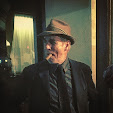 Giants and Dwarfs
Giants and DwarfsFor the past week Lee Breuer has been on the island working with us on creating our adaptations of Greek myths. A giant in the world of avant garde theatre, he is opening his production of A Doll's House later this month in Athens. His production features the mercurial Maude Mitchell as Nora and, in what can truly be called a coup-de theatre, all the men in the production are played by dwarfs! He is nearing the end of his 5 year journey with this play which has been an international hit in 17 countries. Lee is 72 and sharp as a razor, brilliant and down to earth in equal measure. His adaptation of the third part of the Oedipus Trilogy was the Tony winning Gospel at Colonus featuring Morgan Freeman before he was a film star and The Blind Boys of Alabama before all their Grammies. His thinking about theatre is interwoven with his respect for its ancient roots. He recounts how, touring the Theatre of Dionysius as a young man, he tripped on a large flat stone center stage. When told it was, of course, the alter, something clicked for him that is still so present in his work. Indeed while we were touring the ancient theatre at Epidarus, we saw evidence that the area was known to the ancient Greeks as a healing center, associated with Apollo, the God of Medicine and the theatre itself not a place for frivolous escapism but a setting for collective healing and ritual.
The Power Spot
The alter on the ancient Greek stage is at the center of what is called the Orchestra. The audience would sit on benches carved out of the South facing hill, in what was called the Theatron or "Place of Seeing." If you were a priest of Dionysus you would probably have stood just upstage of the alter. Just up of center. How many times, when moving onto the stage for the first time, after weeks in a rehearsal hall, have I tried the find "the power spot" of this or that set. Its always somewhere, whether its a surrealist landscape or a modern living room, every set has a power spot somewhere just up of center. Hmm.
Becoming Gods
Lee's thinking is that all theatre, especially tragedy, is a religious rite in which the practitioners summon a God or Gods and ultimately become them. He likens the Western Sophoclean precept of Instigating Action as the same thing as a call to prayer a la "Dearly beloved, we are gathered here today", or "Brothers and Sisters, Today I want to talk to you about", etc. He sees Rising Action as the sermon, where the speaker or chorus become the gods themselves, and the Climax is that moment in which the God must make a decision, be it Oedipus getting the news or Willy Loman taking the car, its all the same. Our western idea of Denouement is simply the God gradually returning to Earth as we become ourselves again.
Breuers' travels to India further informed his thinking where Katakali dancers, dressed as Gods performed not for a human audience, but for the Gods themselves, represented by idols placed in the front row!
Lee showed us the (unreleased) film of his A Doll's House. In it, the live actors are performing for an audience of dolls, while the women in the play, treated like inconsequential dolls in Ibsen's tragedy, performed in a silent film/opera buffo style, are the only real life sized thing!
Lee Breuer is a real artist and his vision of the theatre is, to my mind, quite suitably larger than life.

No comments:
Post a Comment